
VPSA Oxygen Generators
Oxygen is conventionally produced from air by cryogenic separation process. This is a power intensive & high pressure process which requires power of approx. 1.2 KWH/NM3 of oxygen. The VPSA Process separates oxygen from air at a low pressure While Cryogenic Plants require high capex, VPSA Plants require relatively lower capital. For small capacity requirements, our PSA Oxygen Generator can be used. Air from a Blower is first cooled in an Aftercooler to reduce its moisture content and condensed moisture is separated in Moisture Separator. The cooled air passes through a Tower containing an a adsorbent which has the property to separate oxygen from the air resulting in a gas contains 93% oxygen (balance being argon & nitrogen) coming out as product gas. To ensure continuous flow of product gas, the other Tower is simultaneously regenerated by extracting the gases adsorbed in the previous cycle by a Vacuum Pump. Automatic operation is achieved by opening & closing the valves in a preset sequence by using a PLC. Cost of producing this oxygen is < 0.5 KWH at 0.2 bar pressure. There is a small increment in this due to power required for boosting pressure to required value, but this never exceeds 0.6 KWH/NM3. Overall cost of VPSA oxygen is Rs.5/- to 6/- per NM3 as against Rs. 10/- to 15/- for liquid O2.
...more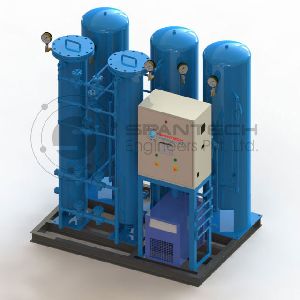
PSA Oxygen Generation System
The PSA Oxygen Generation System produces oxygen suitable for many applications such as brazing/soldering, ozone generation, chemical oxidation, fermentation, waste water & sewage treatment, healthcare, glass & neon manufacture, pulp & paper, furnace air enrichment, preheating of metals, battery manufacture, metal smelting , etc . The PSA Oxygen Generation System consists of two parts – Dry Air System where dry & oil-free compressed air is produced by filters & Dryer and the other is the PSA System where O2 is produced and stored. In the PSA System, dry & oil-free compressed air is passed through a bed of Zeolite Molecular Sieves (ZMS) which has a property of very high degree of affinity to nitrogen, which it retains & releases oxygen as product gas. There are two adsorbers filled with ZMS with one in production cycle while the other is regenerated by depressurization. The two adsorbers are switched from adsorption to desorption automatically. For large capacity systems, a VPSA System is used, where adsorption is done at low pressure and the regeneration is done by vacuum. This helps in reducing power consumption substantially.
...more
PSA Nitrogen Generators
Nitrogen is presently being used in a broad spectrum of industries, laboratories, tank farms, mines, etc. In most applications, the N2 pressure required is less than 6 bar. Despite this, high pressure N2 cylinders are commonly used as source of N2, whose handling is quite hazardous & risky. A better option would be to produce your own low pressure N2 by installing our Nitrogen Generator.
...more
PSA Nitrogen Gas Plant
SPANTECH ENGINEERS PVT.LTD is run by a group of professionals founded in 1992 by a highly experienced engineer from IIT Bombay as a firm manufacturing Compressed Air Systems at first and later integrating forward into PSA Nitrogen Generation Systems, PSA VPSA Oxygen Generation Systems and Ozone Generation Systems This firm became a corporate entity in 2010. We became a ISO 9001-2008 Company in 2011.
...more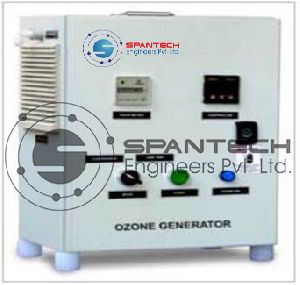
OZONE Generation System
The Ozone Generation System produces ozone onsite using oxygen from the PSA Oxygen Generator as feed gas. This ozone is suitable for many applications such as waste water & sewage treatment, Cooling Tower water treatment, bottled water, pulp bleaching, etc. The Ozone Generation System has an Air Compressor which provides the compressed air to the PSA Oxygen Generator Module where O2 is produced and then stored in the Oxygen Vessel. This O2 gas is subjected to a high voltage, AC electric corona (similar to lightning) in the Ozonator Module, where the molecular oxygen breaks down to atomic oxygen. Some of the atoms of oxygen thus liberated re-form into ozone, while others recombine to form oxygen. The resultant product gas containing ozone is in the circulating water in the Ozone Injection System. The Ozonated water is then used for required application. In some other applications ozone is injected directly in the water or air, as required. Some applications include: COD/BOD Reduction, Cyanide Destruction, Dye Removal, Organic Oxidation, etc. of Water & Wastewater. Cooling Tower Treatment (Bio-fouling control/Chemical replacement). Drinking Water (Pre / Post treatment). Food Processing (Sterilization / Fruit Washing). Chlorine replacement in Commercial Laundry Water. Micro Flocculation of Suspended Solids (Chemical replacement). Odor Removal, Control and Elimination (Water & Air). Pharmaceutical Industry (Process & Ultra purity water). Disinfection of Aquaculture/Fish farms (Chemical replacement). Semiconductor Manufacturing (Ultra-pure / D.I. Water).
...more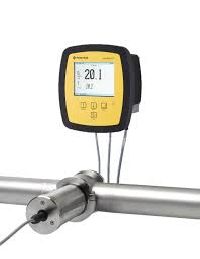
Online Dew Point Meter
When air is cooled, the temp at which condensation takes place is termed the Dew Point (DP). A simple method of determining the DP is to cool the air around a highly polished surface and cooling it. When the DP is reached, condensation on this surface makes it cloudy and the temp observed at this point is the DP. In our Dew Point Measurement System, cooling is done by dry ice ( solid CO2) in a polished tube and temp is measured by a Digital Temp Indicator. This system can be used whenever periodic checking of dew point is required.
...more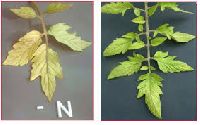
nitrogen plants
SPANTECH Oxygen and Nitrogen Generation Systems are based on non-hazardous and low pressure PSA & VPSA technologies which use compressed air to produce nitrogen & oxygen onsite at a much lower cost than purchased O2 & N2. We believe in Generating Solutions which help you cut your gas costs as well as eliminate the risk of handling high pressure cylinders bottles.
...more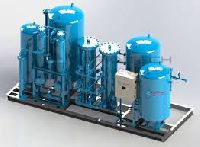
Nitrogen Generators
The PSA Oxygen Generation System produces oxygen suitable for many applications such as brazingsoldering, ozone generation, chemical oxidation, battery manufacture, etc .Compressed air, nitrogen & oxygen are important Utility gases in all types of industries. The Compressed air system is installed in virtually all facilities.
...more
nitrogen compressor
High pressure N2 cylinders are commonly used as source of N2. A better option would be to produce your own low pressure N2 by installing our Nitrogen Generator.
...more
Liquid Nitrogen Generator
The inert properties of Nitrogen makes it widely used in the oil and gas industry. Nitrogen is odourless, non-polluting and non-reactive in nature – and that makes it highly suitable for e.g. pipeline inerting and oil well stimulation. It is also excellent for offshore and refinery processes.
...more
LAB Nitrogen Generator
Nitrogen as an inert gas is a very valued lab gas and is used for a number of lab applications. Application: Nitrogen finds it’s application in labs in Auto samplers, GC’s, LC/MS, Spectrometer, Nuclear Magnetic resonance (NMR), Protein analyzer, Solvent evaporators, Thermal galvanic Analyzer(TGA), Total Organic Carbon Analyzer etc. For Gas chromatography (GC) Nitrogen is widely used in Gas chromatography because Most gas chromatography column stationary phases are based on modified polysiloxane or polyethylene glycol materials. These materials oxidize in the presence of oxygen at elevated temperatures. This behavior, known in part as bleed, will very quickly degrade the performance of the column. FOR Liquid Chromatography-Mass Spectrometry (LCMS) LC-MS uses a HPLC system but at the point of the liquid mobile phases leaving the column the liquid sample is sprayed to produce micro-droplets. These evaporate rapidly releasing ionized analyte molecules which can then be separated in the MS. Large flow sprays can benefit from additional atomization or nebulisation using a high flow of Nitrogen.
...more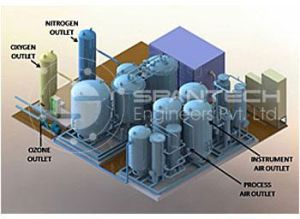
INTEGRATED GAS GENERATION SYSTEMS
Compressed air, nitrogen & oxygen are important Utility gases in all types of industries. The Compressed air system is installed in virtually all facilities, while the other gases are purchased. Recently developed processes have led to dramatically increased use of oxygen, nitrogen & ozone to improve economics & efficiency as well as satisfy environment concerns. Because of increased usage, it became more economical to produce nitrogen & oxygen rather than purchasing them. This can be done by installing our PSA Nitrogen & Oxygen Generators which produce nitrogen & oxygen from compressed air onsite, thereby reducing their costs. This cost reduction has made it possible to use oxygen and nitrogen in applications where it was earlier not economically viable. Some applications: Ozone is used to treat industrial & municipal waste water , for elimination of microbial growth in cooling water. Reduces use of chlorine-based chemicals. Oxygen can be used for enrichment of combustion air used in ferrous & non-ferrous furnaces, lime kilns, glass melting, gasification plants, etc. Improves fuel efficiency & reduces harmful emissions. Pulp delignification & bleaching by Oxygen/Ozone. Dry Nitrogen is used for micronizing of APIs & other products in Air Jet Mills and drying of solvent laden products in Fluid Bed Dryers. Direct oxygen injection in aerobic fermentation improves productivity of biotech products. Producing dry, oil-free compressed air is the first step in Gas Generation, which s done by cooling, filtering, drying & storing the compressed air in a Dry Air Receiver. A part of this dry, oil-free air is used for process & instrument used. Another part is used to produce nitrogen and rest is used to produce oxygen. A part of this oxygen is used to produce ozone and the balance is used for other applications. The Integrated Gas Generation System further improves economics of gas generation by producing all four gases (dry & oil-free compressed air, nitrogen, oxygen & ozone) in a single System. Utilization of excess compressed air is available in your facility will increase your savings further. The System can be tailored to produce whatever gases required in your facility, with compressed air being the mother gas. Details of the individual Gas Generators and their applications are given in respective web pages.
...more
Heatless Air Dryer
Compressed air coming from the Receiver containing solid, liquid & vapour contaminants enters the Dryer through the Pre-filter (where solid & liquid contaminants are removed). It then passes through Oil Removal Filter and enters into Adsorption Tower A1 through a 3-way valve (CV-1) where it gets dried and then passes out of the Dryer through the After-filter. A part of this dry air passes through Tower A2 through the Purge Control Valve, where it picks up the moisture from the adsorbent thereby regenerating it and making it ready for the adsorption cycle. The purge air exhausts out of the Dryer through Purge Exhaust Valve (CV-2) of Tower A2.
...more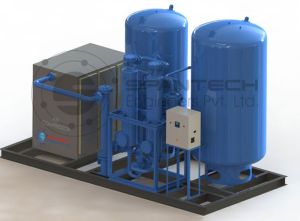
DRY AIR SYSTEMS
Compressed air produced by a Compressor is hot, dirty & humid and cannot be used in this state by pneumatic devices or other uses like producing nitrogen / oxygen, powder coating, pneumatic conveying, sand / shot blasting, micronizing, etc. Our Compressed Air System is a ready-to-use package producing oil & moisture-free compressed air to the purity level required by the end-use. Standard Systems at 7 bar working pressure will give air quality of ISO-8573-1, Class 3:3:2. (Particulates < 5µ, Moisture PDP of - 20 ºC & Oil < 0.1mg/M³) If the end-use moisture content is not stringent (Moisture PDP of +3 ºC, is acceptable), a Refrigeration Air Dryer will be provided instead of Heatless Air Dryer. Lower levels of contaminants can be provided if required. Systems of higher pressure can also be provided. Our Compressed Air System generates oil & moisture-free compressed air which is required for most compressed air applications. The air from the Compressor is first cooled in the Water-cooled Aftercooler with Moisture Separator and is then stored in the Air Receiver. The condensed liquids & other contaminants are flushed out automatically by the Auto Drain Valve. Carried forward fine contaminants are removed in a Prefilter and oil vapour is removed by the Oil Removal Filter. The water vapour is removed by the twin tower Heatless Air Dryer. All above equipment are interconnected & mounted on a sturdy frame.
...more
Auto Drain Valves
Due to cooling of compressed air, condensation of oil & water vapour takes place in Moisture Separators, Air Receivers, Filters, etc. Regular draining of these equipment is an essential maintenance function. By installing Auto Drain Valves, you can ensure that all equipment of the Compressed Air System get drained regularly without manual dependence, except for periodic checks. Low cost timer based ADVs are commonly used, but for larger Systems, zero air loss level based ADVs are used Draining of Compressed air equipment such as Air Receivers, Moisture Separators, Filters, etc. is commonly done by low cost, timer - operated Auto Drain Valves. While these are effective in their functioning, they will open at the set time whether there is any condensate to be drained or not. This will result in loss of compressed air (and hence loss of energy), when there is no condensate to be drained. The 'LEVEL SENSING Auto Drain Valve operation is level - based without any timer. The ADV has a Reservoir (in which condensate accumulates) connected to a drain valve which opens when condensate level reaches the top and closes when condensate level reaches the bottom. These operations are carried out by sensors placed at different levels of the reservoir. By this method only condensate is drained when the ADV opens and there is no loss of compressed air, resulting in saving of energy. The reservoir & valve sizes are matched with the size and type , equipment to be drained, so that the ADV does not operate too frequently. Isolation valve & strainer are provided along with the ADV, for easy cleaning & servicing.
...more
AFTERCOOLERS WITH MOISTURE SEPARATORS
Hot compressed air coming from Air Compressor cannot be used directly in most applications. It is therefore cooled to a temp of around 40o C, which is done in the Aftercooler This is a shell & tube type Heat Exchanger where compressed air in the shell is cooled by plant cooling water circulating in the. tubes. The liquids which condensed due to cooling are separated by the in- built Moisture Separator. Draining can be done manually or by Auto Drain Valve.
...moreBe first to Rate
Rate ThisOpening Hours